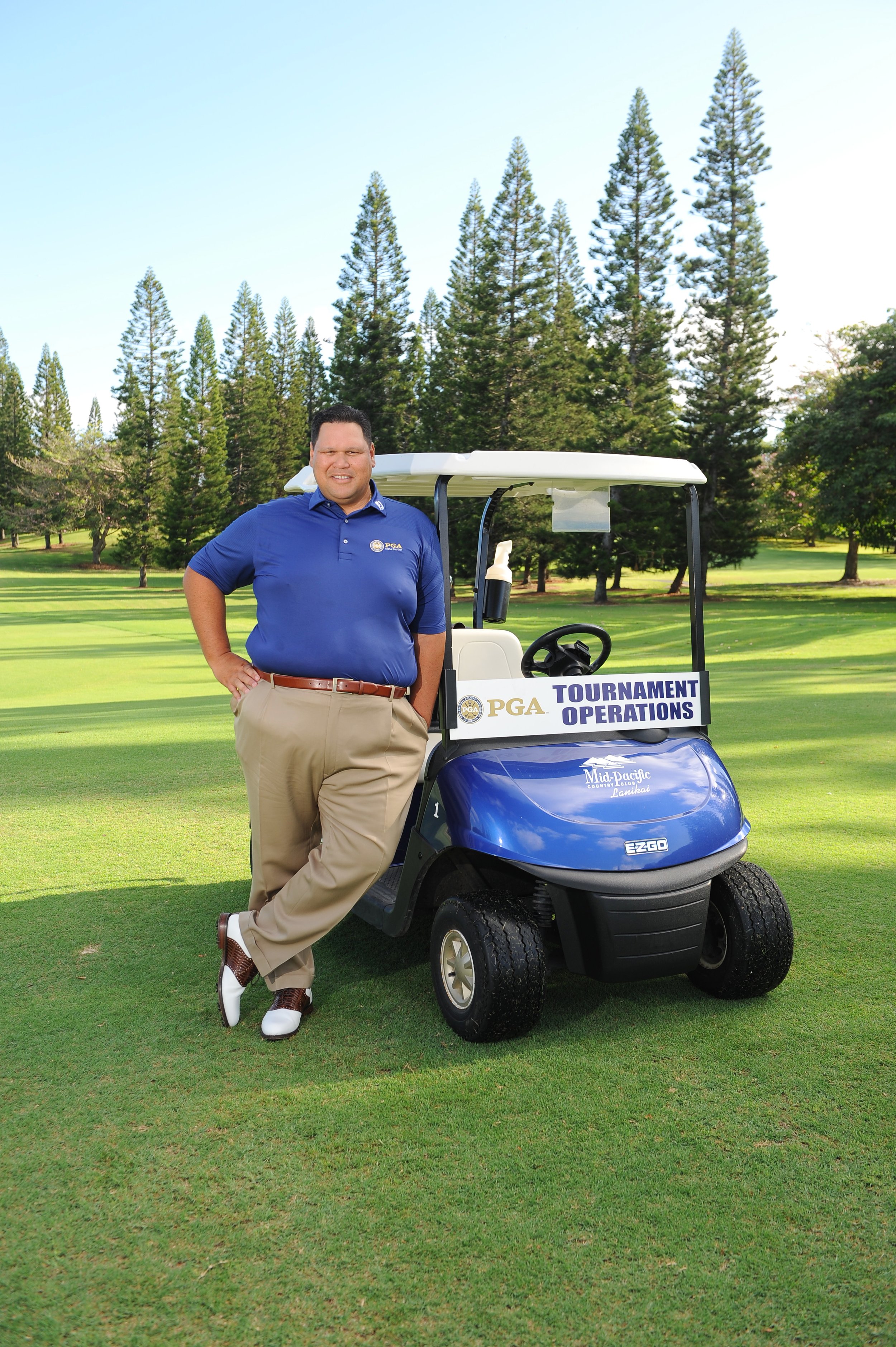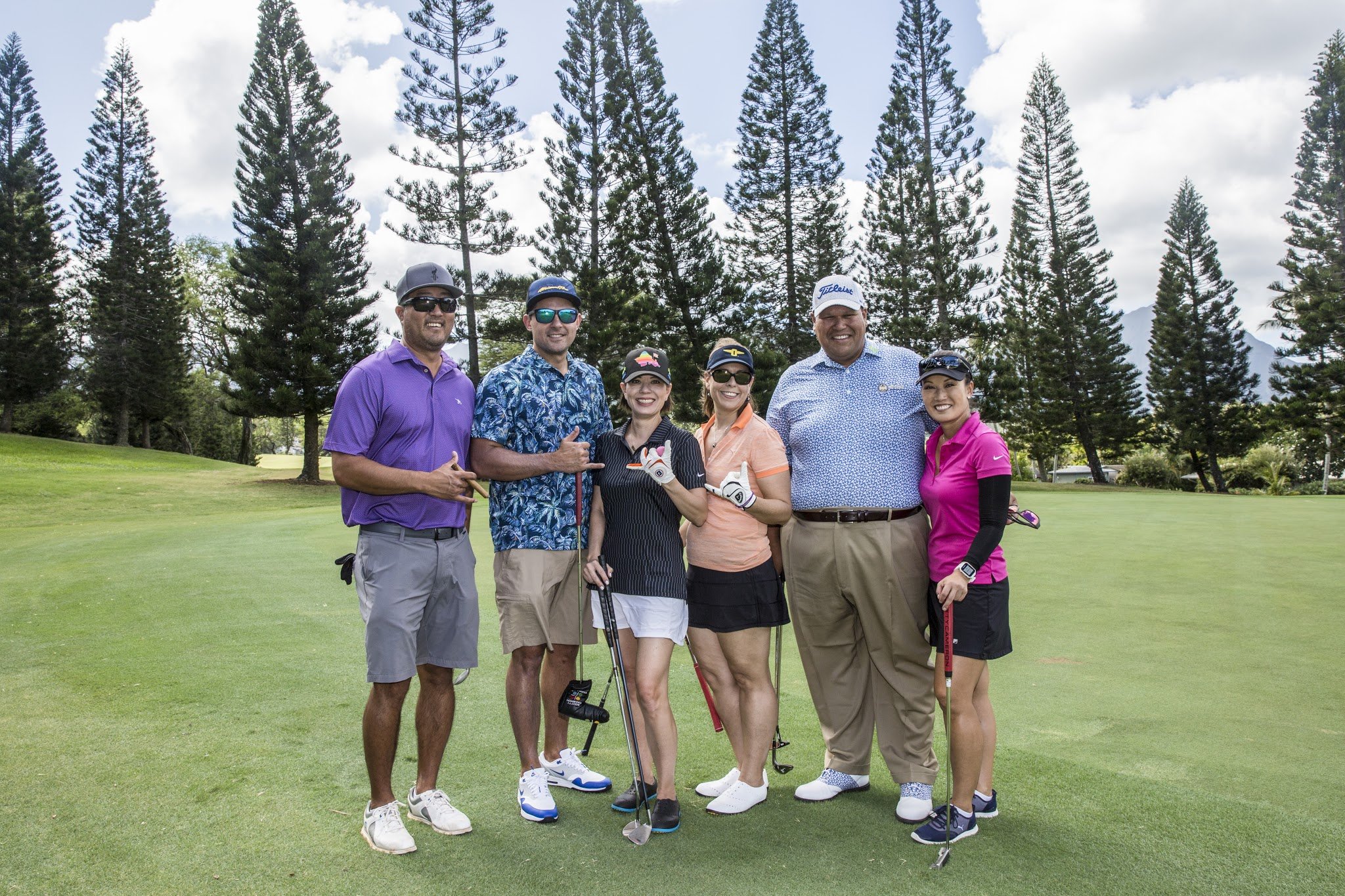On Course




IF WES WAILEHUA WERE A GOLF BALL, HE’D BE CONSIDERED SOMETHING OF A “FLYER.”
That’s the name golfers give to a ball that’s hit from the rough that ends up traveling much further than envisioned. The term perfectly describes the driven (pun intended) 42-year-old Wailehua.
The executive director and CEO of the Aloha Section PGA & Foundation has been an overachiever from his elementary school days. He’s also worked in aviation, another career passion.
Wailehua got his first job at the age of 9 working for Mark Sousa, the PGA head professional at Mid-Pacific Country Club.
Wailehua said he gravitated to golf as a youngster because it was the one sport that he had a chance to excel in over his father, Llewellyn “Tiny” Kanakamaikai Wailehua Sr.
The senior Wailehua was an imposing figure, who dominated Kailua’s football backfield. He earned an O‘ahu Interscholastic Association Hall of Honor Award and was named by Honolulu Star-Bulletin as a Rural O‘ahu All-Star for several years.
Wailehua’s father, the high school football star, grew up to be a business agent for Operating Engineers Local No. 3. At 6-foot-5 inches tall, 265 pounds, the elder Wailehua also was a karate sensei who cut an imposing figure, commanding respect from all who met him, including his young son.
“One day, when I was 9, my father said that I had to get a job by the time that I came home,” Wailehua said.
Wailehua said he was at the golf course driving range angsting over his father’s order when he ran into Sousa, who quickly offered him a job picking up balls on the course for $2.85 an hour. “The child labor laws only pertain to the public sector, so working at Mid-Pac, a private nonprofit club was legal,” Wailehua said. “I ended up working there all the way through high school. That’s kind of how I ended up making golf a huge part of my life.”
The elder Wailehua had an indelible impact on his son in life and in death, which came much too soon.
“It was only three months after I graduated from high school in 1997 that my dad passed,” Wailehua said. “He was only 57. He was on a business trip up in Reno and was heading to Las Vegas for union meetings.”
Wailehua recalls seeing his dad for the last time when he dropped him off at the airport for that trip, which was only supposed to last a week. Instead, the absence stretched into forever.
“Everybody has heroes, right, and they always talk about their parents being heroes, but don’t quite realize that until something like this happens,” he said.
Wailehua said his dad was tough, but he taught him important lessons that have served him his whole life.
“He taught me, ‘no make shame to your family,’” Wailehua remembers. “He also said, ‘Have some pride in what you do. If can can, if no can, no worries.’”
Wailehua said he also learned from his father that “you are who you are,” which became the framework for, “don’t check your Hawaiian values at the door.”
Wailehua said the importance of culture wasn’t something he fully understood until he transferred during his high school years from Punahou to Kamehameha.
“My whole life up until that point, I had wanted to be Japanese—all
my friends were Japanese,” he said. “When I got to Kamehameha, I slowly started to understand all the things that my grandmother used to lecture me on and to really appreciate that I’m three-fourths Hawaiian, which is really rare.”
Wailehua said he learned dedication from his mother Margaret, who just retired in May from Kainalu Elementary School after more than half a century—making her the Department of Education’s longest-serving teacher.
Wailehua said he also found a valuable mentor in Michael Kawaharada, his father’s friend, who stepped in as a hānai parent when he needed the support. From Kawaharada, Wailehua said he learned the value of friendships and how to network.
“He kept me motivated to do good things,” Wailehua said. “Other club members also made a difference in my life. I met my wife Serina because her parents were club members.”
Wailehua’s decision to stay in Hawai‘i to keep his mother Margaret company after the death of his father combined with his club connections ultimately opened doors to a job at Theo H. Davies & Co., a company that was one of Hawai‘i’s Big Five trading and agricultural companies.
The Theo H. Davies job helped Wailehua springboard to president of Hawai‘i Aviation Contract Services (HACS), a company that leases pilots to several additional Japanese domestic and international carriers.
Around the same time, Wailehua got married, but not before pulling out all the stops to convince his wife Serina’s Japanese parents to let him marry her.
“In 2006, we all went to Lāna‘i and I made a speech for her parents in Japanese. It took me three months to memorize it,” he said. “I couldn’t believe when I came to the end, that her Dad’s response was hai, OK.”
Wailehua said he spent an exciting five years at HACS, but left after the financial crisis hit and the company was hit hard by Japan Airlines’ bankruptcy.
Near the end of 2011, the opportunity to lead the Aloha Section PGA came up. The nonprofit organization is one of 41 PGA Sections of the Professional Golfers’ Association (PGA) of America and serves 236 members and apprentices statewide and 90 facilities.
While Wailehua seems like a natural fit to lead the Aloha Section PGA, he wasn’t sure, at first, that he wanted to go from the corporate world into the nonprofit world.
He didn’t have a change of heart until after his wife reminded him that everything that he does comes back to golf, a sport that he had been playing since he was about 6 years old. He’s also coached golf at Kamehameha Schools since 1998.
“For me, this job was most about creating more opportunities to show people that local kids can,” Wailehua said.
It’s also about being a steward of the game of golf, a role that’s grown increasingly challenging in a COVID- 19 world.
Wailehua said the courses that he works with have all adopted new safety standards and protocols and are ready to begin recovering.
O‘ahu’s population has been large enough to fill some tee-times without tourism, but many of the neighbor island courses have had to cut down to minimal operations or close at least temporarily.
Wailehua said the board decided early “in this COVID state of mind” that it wouldn’t collect on any of the contracts or sponsorship money that were due to them this year.
“This was about a time of reaching back out to sponsors, ensuring that they had our support so that they could do what they needed to do to take care of their own businesses and the local families that work for them,” he said. “If the communities are healthy, then they’ll support our facilities and our foundation.”
